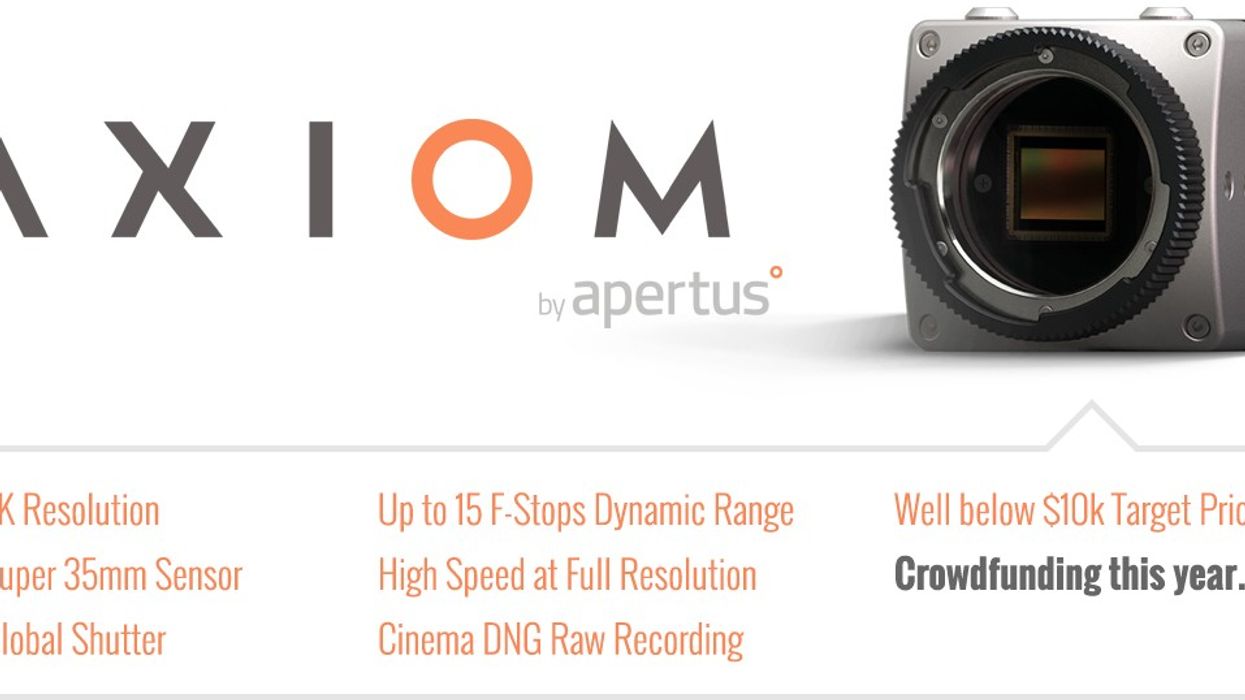'It's Alive!' Apertus Shows Off Infinitely Modular & Open Source 4K Super 35mm Camera

In an age of 6K RAW and 2.5K for $2K cameras rapidly announced and released, it's possible even for novel and notable concepts to fall by the wayside. Amongst the competition, I'm sure I was not alone in hoping against such a fate for the fully-open source Apertus Axiom camera project. A fully transparent and modular global-shutter Super35 CinemaDNG 4K with 15 stops of latitude and 150 fps at full-res is still a damn desirable piece of equipment. It now appears that the Axiom is showing its first signs of life with an improved modular design. Check out the details below.
Given how much has changed since the camera and its mission statement was first announced, I wasn't the only one "feeling the heat" for the Apertus team. From its blog (abridged, my emphasis):
In October 2013, we can see that the market for digital cinema cameras is noticeably more crowded... we have asked ourselves many times if what we are attempting to do is actually a good idea... emerging from an international community with no corporate funding behind us. A number of people have called us crazy and predicted that our vision will not be a success. And after opening up our doubts, our fears and examining them at length, we are still arriving at the same conclusion: YES, this is what our hearts and minds are set on and we're going to do it!
In a sense, the low-cost/high-quality world of digital motion picture cameras has been primed for Apertus's proposition on multiple fronts. The geniuses of Magic Lantern have rewritten expectations and exposed the "limitations" of out-of-the-box DSLRs (all in a collaborative open source context). The open format CinemaDNG is finally getting some serious support from its parent Adobe, and has good friends in Blackmagic & DaVinci Resolve. And, of course, manufacturers RED and Sony have proven the flexibility of modular design (especially with third-party hardware).
At the same time, the rapid nature of change in the camera market has put some ill at ease -- and understandably so, in many cases. The timing of BMPC 4K's announcement in relationship to its predecessor's shipping delays raised big questions about investment vs. obsolescence -- unplanned or otherwise. In this sense, too, the creators of Axiom are far from oblivious:
We want to stress that Axiom will not be outdated anytime soon - it will be built from the ground up as a system that will evolve over time. We and the entire community will be able to deliver new interfaces, codecs, firmware and significant degrees of newer functionalities all via a simple software download to the camera. It is our intention to use this to create a very powerful ecosystem around Axiom, providing long term support alongside the development of new features.
Even now, this vision puts the modularity of other camera systems in a new light. What's so great about modularity if there's only one source of components -- or a very limited number of sources, with mixed-bag pros and cons to the offerings of each? With an active enough community, total transparency, and the knowledge-base that a fully open source environment could establish, the sky truly is the limit for Axiom. Completely remove traditional product cycles from the motivation of any camera design and you have something of a revolution, really.
The rest is enough to cast at least some doubt aside. Here is a large rendering of Axiom's Open Module Concept, courtesy of Apertus (click for full size):
The excitement has a definite direction, too: in addition to extremely intriguing mock-ups, actual progress is being made. The title of another recent post, "Axiom Alpha Prototype Hardware complete," tells you a good amount about what you'd want to know regarding the present state of Axiom affairs. In its efforts so far towards assembling and testing a 'feature-reduced Alpha,' Apertus is seeing results:
At present, all [alpha] components have been properly installed and testing/verifying electrical connectivity has indicated that everything is in good working order. On the software side of things, we have basic communication with the sensor on the Zedboard up and running and can set/get registers on the image sensor through the Zedboard's Linux shell. The next step involves getting actual image data from the sensor, however before we can do this we have to create a memory interface for reading/writing to and from DRAM, storing and retrieving the image data from inside the FPGA.
Price-wise, this camera will not be able to compete directly with something like the Blackmagic Production Camera 4K -- although, as indicated in the promotional graphic above, it should come in "well under" its original 10K target price. Nor is this a machine that really fits into the 'mainstream' market at all. This project will not be one for the impatient prospective camera buyer. These embryonic affirmations of functionality are good signs, but Axiom has a long way to go. It is not with doubt, but with some vague sense of appreciation for their determination, that I wish Apertus the very best of luck. Few pursuits contribute to a 'democratization of filmmaking' in the ways this project is trying to. Now, back to being patient.
In the meantime, Apertus is planning on a crowd-funding campaign following the completion of a working prototype. They could also use some help testing their HDMI output test pattern generator and things on the engineering side in general. So, if you want to help the Axiom from the lab to reality, head over to Apertus.
Links:




 "'Back Home"via Mercedes Arutro
"'Back Home"via Mercedes Arutro 'Back Home'via Mercedes Arutro
'Back Home'via Mercedes Arutro 









